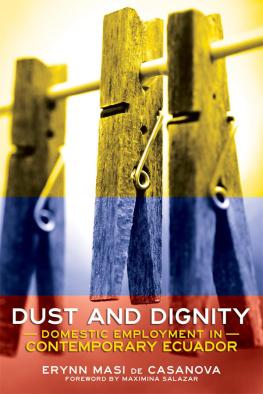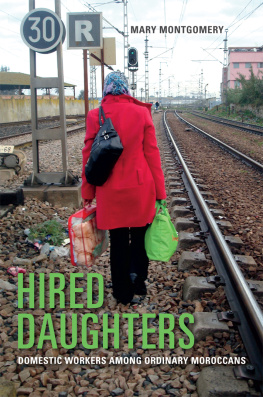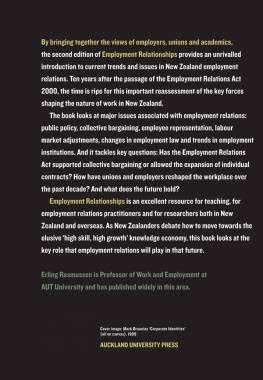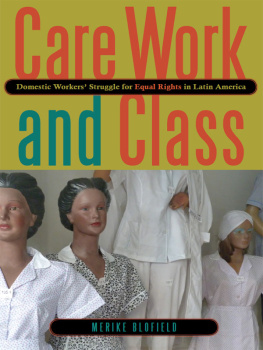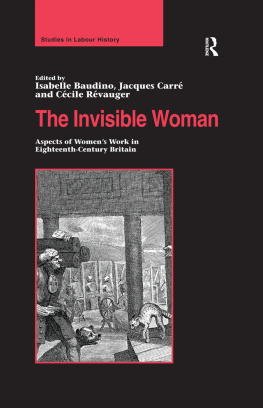DUST AND DIGNITY
Domestic Employment in Contemporary Ecuador
Erynn Masi de Casanova
ILR PRESS
AN IMPRINT OF CORNELL UNIVERSITY PRESS
ITHACA AND LONDON
To all the women informal workers who are unseen and underpaid
Para las mujeres trabajadoras informales en reconocimiento de su lucha, trabajo, y sacrificio
Contents
Foreword
The biggest obstacle that household workers face in Ecuador is the lack of compliance with labor laws. The laws exist, but they are not acted on, and it seems that they dont matter to the authorities today. We the household workers have carried out a daily struggle ( lucha ) to achieve some changes, like respecting the eight-hour workdayso that we, like any other worker ( trabajador o trabajadora ), can work Monday to Fridayand requiring social security coverage. We have engaged in political activities on behalf of members of this occupation. For example, we lobbied for the ratification of the International Labor Organizations Convention 189. But, at the moment, there is a reversal in the observance of our guaranteed rights.
On the topic of social security, we conducted a research study, whose results are presented in this book, to see how many household workers are enrolled in social security. Then we launched another study to determine the education levels and work histories of remunerated household workers. Investigating the experiences of the workers is the best way to get real information that comes right out of their lives.
With Erynn Masi de Casanova, at first we got to know each other casually, but as time passed she has cooperated with us, supporting us in the research about social security and other topics. She was the one who trained us so that we could conduct surveys with this important labor sector. Because we didnt know how to do the analysis, we had to have a professional. She was the one who did the tabulation and analysis, as we had agreed. I also want to state that she is now our friend and comrade ( compaera ). Thanks to God and to life that we had the privilege of getting to know each other.
These collaborations between academics and activists are ways of helping others when there are not sufficient resources. This is true teamwork, and I see it as a way of supporting the organization.
Maximina Salazar
President of the Association of Remunerated Household Workers
(Asociacin de Trabajadoras Remuneradas del Hogar)
Guayaquil, Ecuador
Acknowledgments
I owe thanks to many people who supported me in this project, which has spanned nearly a decade:
Primero que nada, gracias a las compaeras de la Asociacin de Trabajadoras Remuneradas del Hogar por compartir sus historias y colaborar en el diseo de algunas partes de esta investigacin y en la recopilacin de datos. Su ejemplo de dedicacin, solidaridad, y amistad me ha afectado profundamente .
Gracias a la Sra. Lola Proao Yela, por compartir su casa y recibirnos con tanto cario .
To the people who opened doors for me in Ecuador: Irma Guzmn de Torres, Jorge Caldern, Amy C. Lind, Jo Vervecken, and Magal Marega.
To Frances Benson and the team at ILR Press, thank you for your faith in this project; it is a pleasure to work with you all.
To the Charles Phelps Taft Research Center, which partially funded the project, and my colleagues in the Department of Sociology at the University of Cincinnati, who can be counted on for both cheerleading and critique. And my writing group, without whom I would publish nothing worth reading: Danielle Bessett, Sarah Mayorga-Gallo, Rebecca Sanders, and Rina Verma Williams.
To the UC sociology graduate student research assistants who helped with content analysis and literature reviews: Jeremy Brenner-Levoy, Roco Bueno Roldn, Sevsem iek-Okay, Jeffrey Gaver, and Amanda Staight.
To the Rockefeller Foundation Bellagio Center, which provided the time, space, and inspiration to finish the first draft of the manuscript during an academic writing residency, and to my Bellagio family, who encouraged me to be bold and creative and live in the moment.
To friends who are not just brilliant scholars of social life, but also funny, loyal, and gorgeous human beings: Littisha A. Bates, Tamara R. Mose, Holly Y. McGee, Shailaja Paik, and Leila Rodrguez (who gets an extra thank you for helping me with the statistical analysis for this book).
To Juliana Sarmento da Silveira for creating the GIS map depicting workers commutes.
To the researchers of domestic work in Latin America, who produce ground-breakingand sometimes heartbreakingscholarship that deserves a bigger audience.
To my family: Joaqun, Soledad, and Henry. You are home for me, no matter where we are.
INTRODUCTION
During some unusually cool and breezy days in Guayaquil, Ecuador, when the early matches of the 2018 World Cup dominated televised and in-person conversations, a national TV channel aired a series of sketches called Sin peroles no hay paraso. A play on the title of a popular Colombian telenovela , the phrase uses a term, perol , that denotes both a heavy metal pot with handles and a paid domestic worker. Without these workers, according to this sarcastic title, there is no paradise. In one of the sketches, a character called La Gringa, white and blond, introduces herself in English. She then describes, as she sweeps wearing a sexy maid costume, how she came to Ecuador from the United States out of economic necessity, but has grown to love the country. The moment she stops sweeping, her employer, played by an actress wearing blackface and a wig of long braids, appears and begins scolding her, swinging her hair around as she imposes her authority on the apologetic employee. The supposed humor in this sketch is built on the absurdity of a gringa domestic worker in the employ of a black woman. The audience knows this because, despite the declining number of full-time domestic workers in recent years, they have watched many inversions of this scene, on screen or in person, featuring people who consider themselves white berating domestic workers seen as nonwhite.
This brief sketch grotesquely demonstrates key elements of the domestic employment relationship: the abuse of power, the racialization of the occupation, and the poverty that leads women to do domestic work for wages. The term perol itself reduces the worker to the very object she uses to do her work in the kitchen of her employers. This book, based on research conducted between 2010 and 2018, explains why domestic work remains an occupation of last resort in Ecuador (and elsewhere) and discusses how these working conditions might be improved. In exploring the experiences of paid domestic workers in Ecuador, I show how concepts of social reproduction, urban informal employment, and class boundaries can help illuminate the particular forms of exploitation in this work and explain why domestic work continues to be a bad job. If we want to improve conditions for workers, we need to pay attention to these three dimensions.
The International Labor Organization (ILO) defines domestic work to include housework; caring for children, ill, disabled, or elderly people in private homes; and tasks such as driving the family car, taking care of the garden, and guarding private houses (ILO 2016a, 3). An estimated 67 million people, mostly women, are employed in domestic work worldwide and 50 million of these are informally employed (9). An estimated 27 percent of the worlds domestic workers live in Latin America and the Caribbean (OIT 2018, 27). Thirty percent of families in Latin America are involved in domestic work either as employers or workers (Blofield and Jokela 2018, 534). Statistics likely undercount the population employed in domestic work, because it is informal and stigmatized. Work becomes invisible when it is done off the books, by poor women, behind closed doors in private homes.

